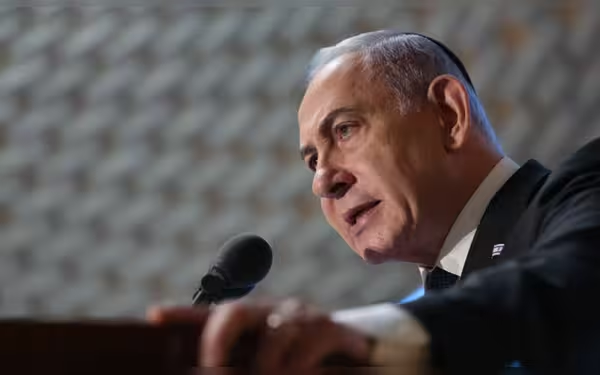Saturday, November 16, 2024 05:50 PM
Netanyahu Criticizes Macron Over Arms Supply Halt to Israel
- Netanyahu condemns Macron's call for arms supply halt.
- Israel continues military operations against Iranian-backed groups.
- Netanyahu emphasizes Israel's fight for survival against terrorism.
 Image Credits: brecorder
Image Credits: brecorderNetanyahu criticizes Macron for urging a halt to arms supplies to Israel amid ongoing military operations against Iranian-backed groups.
In recent developments, tensions have escalated between Israel and various groups in the Middle East, particularly in Gaza and Lebanon. Prime Minister Benjamin Netanyahu has publicly criticized French President Emmanuel Macron for his call to halt arms supplies to Israel. This situation arises as Israel continues to engage in military operations against what it describes as forces of barbarism, primarily backed by Iran.
Netanyahu's statement reflects a growing frustration among Israeli leaders regarding international responses to their military actions. He stated, “As Israel fights the forces of barbarism led by Iran, all civilised countries should be standing firmly by Israel’s side.” This sentiment underscores Israel's view that it is in a fight for survival against groups like Hezbollah, Hamas, and the Houthis, all of which receive support from Iran.
In his remarks, Netanyahu pointed out the hypocrisy he perceives in the calls for an arms embargo against Israel. He questioned, “Is Iran imposing an arms embargo on Hezbollah, on the Houthis, on Hamas and on its other proxies? Of course not.” This statement highlights the ongoing support that these groups receive from Iran, which Israel sees as a direct threat to its security.
Netanyahu further emphasized that the so-called “axis of resistance,” which includes these militant groups, stands united against Israel. He expressed his dismay that countries that claim to oppose this terror axis are instead advocating for restrictions on Israel. “What a disgrace!” he exclaimed, indicating his belief that such actions undermine the fight against terrorism.
As the conflict continues, Netanyahu assured that Israel would persist in its military efforts, stating, “Rest assured, Israel will fight until the battle is won - for our sake and for the sake of peace and security in the world.” This declaration reflects a commitment to what Israel perceives as a necessary struggle for its existence.
The ongoing conflict and the international reactions to it raise important questions about the balance between national security and global diplomatic relations. As nations navigate these complex issues, it is crucial to consider the broader implications of military support and the responsibilities that come with it. The situation remains fluid, and the international community's response will likely shape the future dynamics of the region.













